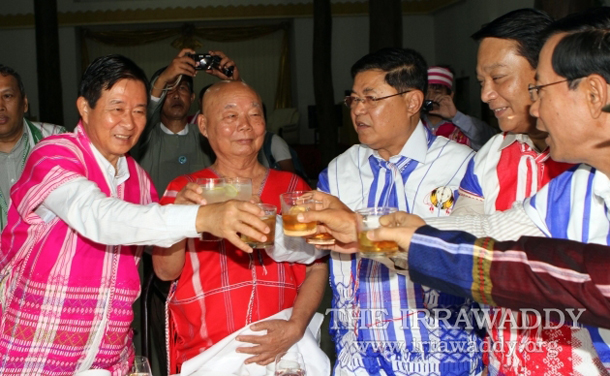RANGOON—Ethnic Karen civil society organizations held a meeting with Karen National Union (KNU) leaders in Rangoon on Tuesday to discuss the ongoing peace process between the KNU and the government, in order to ensure that various Karen groups are involved in the process. The groups also urged the KNU to heal recent rifts within its leadership and remain united.
About 60 participants from more than 10 different Karen organizations, including members of youth groups, politicians and religious leaders from inside Burma and abroad, met with KNU Joint-Secretary Daw Lay Mu, KNU Chairman for Mergui/Tavoy District Kwe Htoo Win and Htoo Htoo Lay, a former KNU leader, at a church in Rangoon.
During the meeting, representatives of Karen CSOs from Rangoon, Pegu and Irrawaddy divisions expressed support for the peace talks and urged the inclusion of Karen from all backgrounds in the process. Some said the KNU peace talks should prioritize progress in political affairs over economic interests.
“Our Karen civil societies’ aim is to find national unity among Karen people [during the peace process]. The first step is to get together with the KNU,” said Rev. Saw Matthew Aye, coordinator of the Karen Peace Support Team. Matthew Aye, who organized the event, said the current ceasefire was a good move towards reaching a more comprehensive peace agreement.
The KNU signed a ceasefire agreement with a government peace delegation team led by Aung Min, Minister of the President’s Office, on Jan. 12. The KNU is one of the major ethnic armed groups in Burma and has fought a civil war for autonomy for more than 60 years.
KNU chairman Kwe Htoo Win told the meeting’s participants that the KNU would continue to strive for self-determination for the Karen and a federal system of government that would allow a degree of political autonomy for the group. “But the KNU doesn’t want to split from the country,” he added.
Karen CSOs also stressed the need for KNU unity and asked the leadership to solve its internal disputes.
“We are sad to hear that there are internal conflict within the KNU leadership,” Matthew Aye said. Some also urged the KNU to admit younger members during the election of a new central committee at its congress in late December.
The KNU dismissed three leaders on Oct. 2 for violating the organization’s protocol by opening a liaison office in the Karen capital Pa-an without the approval of other KNU central committee members.
Since then, the leadership has tried to bridge the rifts by reinstating two dismissed members, military chief Gen. Mutu Say Poe and the head of the social welfare department, Roger Khin. The third, former head of the justice department David Htaw, passed away recently and has yet to be replaced.
The KNU Joint-Secretary Daw Lay Mu assured the CSOs that unrest among its top would not endanger the peace talks. Following the upcoming congress, he said, the new KNU leadership would hold further peace talks, including the development of a code of conduct for both parties. This code would set guidelines for the behavior of government and rebel troops during the ceasefire.

















